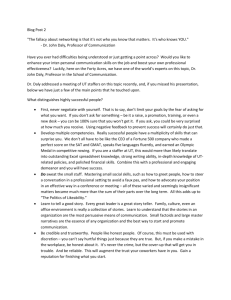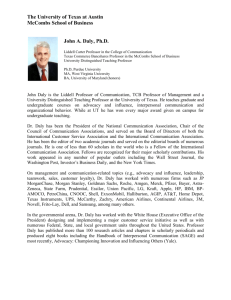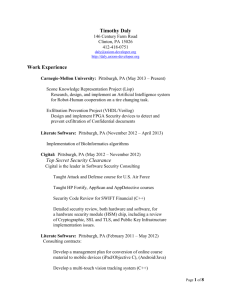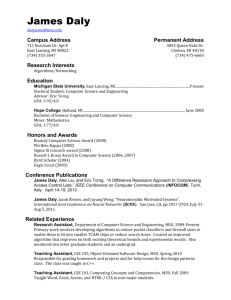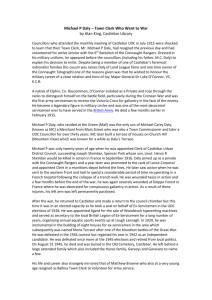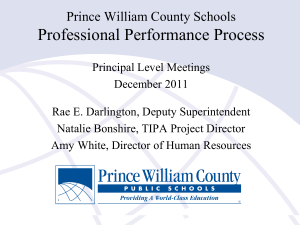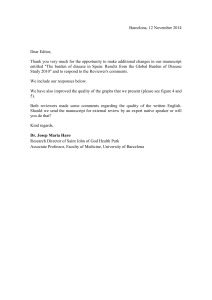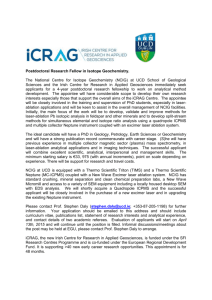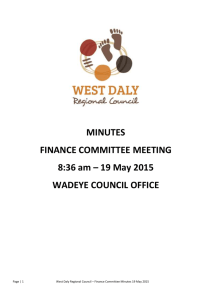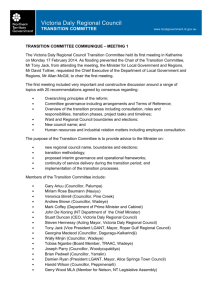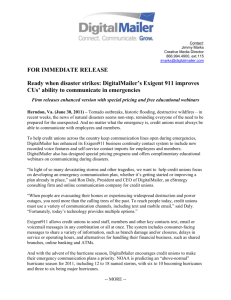Timothy Daly 146 Century Farm Road Clinton, PA 15026 412
advertisement
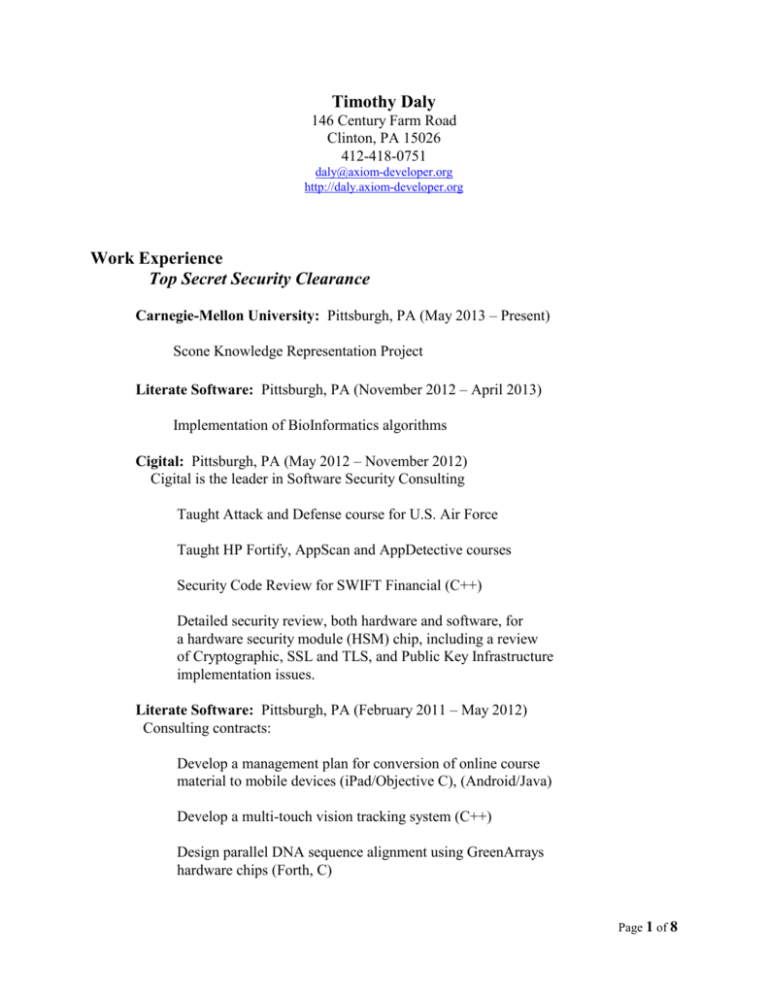
Timothy Daly 146 Century Farm Road Clinton, PA 15026 412-418-0751 daly@axiom-developer.org http://daly.axiom-developer.org Work Experience Top Secret Security Clearance Carnegie-Mellon University: Pittsburgh, PA (May 2013 – Present) Scone Knowledge Representation Project Literate Software: Pittsburgh, PA (November 2012 – April 2013) Implementation of BioInformatics algorithms Cigital: Pittsburgh, PA (May 2012 – November 2012) Cigital is the leader in Software Security Consulting Taught Attack and Defense course for U.S. Air Force Taught HP Fortify, AppScan and AppDetective courses Security Code Review for SWIFT Financial (C++) Detailed security review, both hardware and software, for a hardware security module (HSM) chip, including a review of Cryptographic, SSL and TLS, and Public Key Infrastructure implementation issues. Literate Software: Pittsburgh, PA (February 2011 – May 2012) Consulting contracts: Develop a management plan for conversion of online course material to mobile devices (iPad/Objective C), (Android/Java) Develop a multi-touch vision tracking system (C++) Design parallel DNA sequence alignment using GreenArrays hardware chips (Forth, C) Page 1 of 8 Design literate software extraction program (Lisp) Carnegie Mellon University: Pittsburgh, PA (July 2005-February 2011) The Carnegie Mellon Software Engineering Institute (SEI) is a federally funded research and development center. The SEI staff has advanced software engineering principles and practices in software engineering, computer security, and process improvement Computer Forensics – Member of team developing “cutting edge” tools to to enable government and law enforcement agencies to recognize and combat emerging cyber threats.. Concordia – (Independent Research Project) Concordia is an architecture for the parallel generalization of patterns, finding their invariant structure, and using those patterns to predicate associations. http://daly.axiom-developer.org/CONCORDIA.html XNET CERT “train as you fight” Exercise Network is a cyber-security platform for doing “live fire” exercises to replicate real-world cyber attack, defend, and respond missions. Main focus involves writing dynamic IPTable module to route remote users to back end server farms. https://www.vte.cert.org/vteweb/ Function Extraction (FX) is a disruptive new technology that will substantially improve the economics of software development and increase the dependability of software systems. Function Extraction applies mathematical foundations to automate calculation of the behavior of software, the objective being to replace slow and fallible manual methods of code reading and inspection with fast and correct computation of behavior. Main focus of involves the definition of semantics for Intel instruction set. http://functionextraction.info/fxlong.wmv Network Situational Awareness (NetSA) iSiLK Configuration Editor The CERT/NetSA has developed and maintains a suite of open source tools for monitoring large-scale networks using flow data. The System for Internet Level Knowledge (SiLK) is an efficient network flow collection and storage infrastructure that will accept flow data from a variety of sensors. SiLK also provides a suite of efficient command-line tools for analysis. iSiLK is a graphical front-end for the SiLK tools, designed to work with an existing installation of the SiLK analysis suite. Contribution to iSiLK was the Configuration Editor written in Python. http://thewebmaestra.com/isilk.html Member of Board of Directors of the Association of Lisp Users http://lisp.org/alu/home Page 2 of 8 CAISS Institute City College of New York: New York, NY (Sept 2002-May 2005) Research professor leading three open source projects: Axiom, Magnus, and Doyen. Managed 7 students. Worked with ACM and ISSAC. Research work in Literate Programming. Lead developer on Magnus, an infinite group theory package Exploratory Infinite Group Theory (Gilbert Baumslag, Marianna Papaleo, Xiawei Xu, Marcos Zyman, Peggy Dean) ~150k lines of source code http://sourceforge.net/projects/magnus Lead developer on Doyen, a liveCD science platform. Doyen - Science Platform (Wilken Rivera, Jose Alfredo Perez) http://sourceforge.net/projects/doyencd Indefinite Grant (Bill Sit, Gilbert Baumslag, Sean Cleary, Douglas Troeger) Research in Symbolic Indefinites NSF Principle Investigator ITR Grant Proposal Axiom (Jan 2003) ITR Grant Proposal Axiom (Jan 2004) Conference Chair “The Future of Scientific Computation” (CCNY 2004) FEDORA - RedHat Active Developer WorldCom: Rye, NY (Oct 2000-July 2002) Team Lead to install monitoring system for all data center switching within WORLDCOM (93 Worldwide) . SNMP monitoring for failure alerts and billing. Wrote a Java/XML program to audit actual equipment vs monitoring database. Managed a lab of networking equipment and racks of Linux and Sun servers to test management software and network configurations for Worldcom data centers. Wrote performance and stress testing software for high-end backbone routers and switches. Cold Spring Harbor Labs: Long Island, NY (Oct 2000-April 2001) Consulting work for Stein Labs developing a program to enable Biochemistry researchers to search and annotate DNA patterns. Contract work on web-enabling SNP searches in DNA sequences Page 3 of 8 Centrport: Westport, CT (Feb 2000-Oct 2000) Developed a converged user interface for 4 internal systems that are used to deploy web based measurement and marketing programs (a Facade pattern). Programming in Java and Perl. Developed a Makefile hierarchy to coordinate multiple developers. UUNet: Katonah, NY (Dec 1998-Feb 2000) Responsible for designing programs to monitor the status of servers and databases on the UUNET global hosting network (~3500 nodes). Wrote a multithreaded, distributed monitoring program in Java that used the ModelView-Controller pattern. It shows the status of hosts and databases, displays a "trouble board" of failing systems, and interfaces to a Remedy trouble-ticket system. Specified and created a networking lab to test Gigabit switching networks from various vendors for deployment in UUNET centers. Approach: Valhalla, NY (Dec 1996-Dec 1998) Technology demonstration for Comcast. Wrote a statistics program demonstrating the use of Java (J++) and DCOM. The statistics were shown on a web page using an applet. Business case detailing a plan to build up its EDI consulting. Created Java classes that implement the segments and constructed the BAPLIE (shipping) and JAPRES (job application) message sets. Product to handle all aspects of paying commissions to sales people at Comcast. This was an 18 month, 10 person effort. As one of the primary developers on the project, the efforts included: - A proof-of-concept in Java. The proof of concept used both Access and a SQL 6.5 Server database using ODBC. - Wrote SQL and Stored Procedures to access and validate data. - A CLIPS-compatible rule-based program was used in the business layer of a 3tiered architecture. The results were displayed using a GUI spreadsheet built with Java's AWT package. - The central payment system in C++ and Visual Basic. - Responsible for 3 major DLLs of the final system to handle the business rules and commission payment computations. - Wrote OLE Automation objects in C++ to interface a commercial rule engine to the final system. The engine was run out of process using MTS and DCOM components. All testing was done in Java. Page 4 of 8 - Wrote a debugging COM component that send TCP/IP (UDP) packets to a Java debugging package I wrote. The system was constructed to run on Windows NT. Co-lead for development of an ECommerce guide for use in pre-sale client interviews Systems Analysis for requirements gathering and use-case design for streaming video presentations. Development of a reuseable 3-tier architecture using CORBA and Java, interfacing with COM components. And UML patterns to automate the construction of large portions of the architecture for client applications. International Business Machines Corporation: Yorktown Heights, NY (1978-1996) Thomas J. Watson Research Center Natural Language Understanding – Developed CHART parser and knowledge representation program (KREP-based) to read mail, extract sentences involving priority phrases, scheduling phrases, and meeting phrases to sort, prioritize, and schedule calendar events. Rewriteable Paper (1995) – Independent research project to invent, patent, and develop rewriteable paper based on organic materials. Axiom Symbolic Computation System (1995) – Research and development of commercial product in computer algebra. Primary task was the development of system interpreter internals, written in Lisp. Develop algebra for Denavit-Hartenberg Matrices. ECLPS (1989) – Development of commercial rule-based programming language for Expert Systems. Common Lisp, based on OPS5 from CMU. FAME (1989) – Wrote KROPS, the implementation language for FAME (Financial and Marketing Expert) based on OPS5 for rules and KREP for knowledge representation. BOXER (1986) – Research in Robot Planning. Invented and developed a system to reason about solid models and generate robot motions to perform automatic assembly as a “design-to-build” system. AML (1984) – Co-author of AML Robot Language, an IBM commercial real-time robot control. Received Patent for Slip Sensor (#4,605,354) Page 5 of 8 VM/370 Systems Programmer (1981) – Mainframe operating system performance and tuning. Co-authored subsystem to manage free storage, shipped as part of high performance upgrade to VM/370. ARCHIVE (1979) - Designed and developed an online archival storage and retrieval system using a hierarchy of disk and tape backups. Unimation: Danbury Ct (May 1976-July 1978) VAL Co-developed Real Time commercial robot programming language. Open Source Work (1997-present) Axiom – Computer Algebra system, originally written at IBM Research and sold as commercial competitor to Mathematica and Maple. Open sourced in 2001. Lead developer (http://axiom-developer.org) Active. Magnus – Infinite Group Theory Computer Algebra system, originally written at City College of New York CAISS Institute. Lead developer. (http://sourceforge.net/projects/magnus) Active. Doyen – Scientific Platform on Live CD. Used by Sage, Axiom, and Magnus. Lead developer. (http://daly.axiom-developer.org/doyen) Active. Pinger – Protocol-agile real-time monitoring of internet backbone routers and data center server racks. Used for trouble detection at Worldcom. Lead developer. (1997, project defunct) Teaching Experience City College of New York, New York, NY Open Source Programming (Fall 2004) Vassar College, NY Poughkeepsie, NY Compilers (Spring 1990) Programming Languages (Fall 1990) William Patterson University, Wayne, NJ Data Structures (Fall 1981) Education Page 6 of 8 Polytechnic Institute of New York: Brooklyn, NY (September 1997) Ph.D program (thesis incomplete) Topic: “Provisos -- Conditional Computational Algebra” Fairleigh Dickinson University: Teaneck, NJ (May 1980) M.S. Computer Science. Montclair State College: Montclair, NJ (June 1975) B.A. Mathematics, minor Computer Science. Related Courseware Operating Systems, Systems Programming, Reliable Software, Switching Theory, Dynamic Simulation, Automata Theory, Formal Languages, Numerical Analysis, Compiler Design Image Analysis, Pattern Recognition, Learning Machines Computer Languages JAVA, C++, C, LISP, ECLPS, OPS5, AML, VAL, PASCAL, PL/I, FORTRAN, MODULA2, COBOL, BASIC, SNOBOL, ALGOL, APL, MASM, BOOT, A# (Computer Algebra Languages), UNIX shells, MACRO(DEC assembly lang.), BAL(IBM assembly lang.) HASL(Intel 8080 assembly lang.) Publications Daly, T., Burns, L. Concurrent Architecture for Automated Malware Classification. Proceedings of Hawaii International Conference on System Sciences, January 2010 Burns, L., Daly, T., FXplorer: Exploration of Software Behavior A New Approach to Code Understanding and Verification, Function Extraction for Computation of Software Behavior. Proceedings of Hawaii International Conference on System Sciences, Kona, Hawaii, January, 2009. Bartholomew, R., Burns, L., Daly, T., Linger, R., Prowell, S., Function Extraction: Automated Behavior Computation for Aerospace Software Verification and Certification, American Institute of Aeronautics and Astronautics, Sonoma, CA 2007. Mili, A., Daly, T., Pleszkoch, M, Prowell, Stacy, A Semantic Regognizer for computer Loop Behavior, Proceedings of Hawaii International Conference on System Sciences, Kona, Hawaii, January, 2007. Linger, R., Burns, L, Daly, T., Pleszkoch, M., Prowell, S., Sayre, K., Walton, G, Function Extraction Invention Disclosure, 2007. Page 7 of 8 Daly, T. Axiom: The 30 Year Horizon. A Tutorial Dec 2005 288 pages Lulu.com ISBN 141166597X Daly, T., Axiom Computer Algebra System ACM SIGSAM Bulletin, Vol 36, No. 1, March 2002, Workshop on Open Source Computer Algebra, May 2002, Lyon France (Invited Paper) Daly, T., Provisos: A Programming Extension for Conditional Computational Algebra (Ph.D. Thesis, incomplete) 1995 Daly, T., Susan: Adding Meaning to Desktop Folders, IBM Internal publication May, 1992 Jenks, et.al., Axiom: The Scientific Computation System Springer-Verlag, NY ISBN 0-387-97855-0 May, 1992 Daly, T., Axiom Library Compiler Book Chapter 21, NAG LLC, England, May 92 Daly, T., Kastner, J.; Mays, E .Integrating rules and inheritance networks in a knowledge-based financial marketing consultation system, Volume 3, Issue , 5-8 Jan 1988 Page(s):496 - 500 HICSS 1988 Daly, T., Verification and Validation of Rule Based Programs, ASME June 1989 Daly, T., Integrating Rules and Inheritance Networks IBM RC 13144, Sept 1987 Schor, Marshall; Daly, Timothy; Lee, Ho Soo; Tibbetts, Beth “Advances in RETE Pattern Matching” Proc. of AAAI, AAAI-86 August 1986 pp226-232 0-934613-13-3 Schor, Marshall; Daly, Timothy; Less, Ho Soo; Tibbetts, Beth “YES/OPS Extensions to OPS5: Language and Environment” Technical Report RC-11900 IBM T.J. Watson Research Center Yorktown Heights, NY 10598, 1986 Daly, T., Boxer – A Design-to-Build System IBM RC 11096 June 1985, Invited presentation at MIT Robot Symposium Bozman. G., Buco, W., Daly, T., Tetzlaff, W. Analysis of free storage algorithmsRevisited. IBM Systems Journal 1. 23, 1 (Feb. 1984). 44-64 Page 8 of 8
